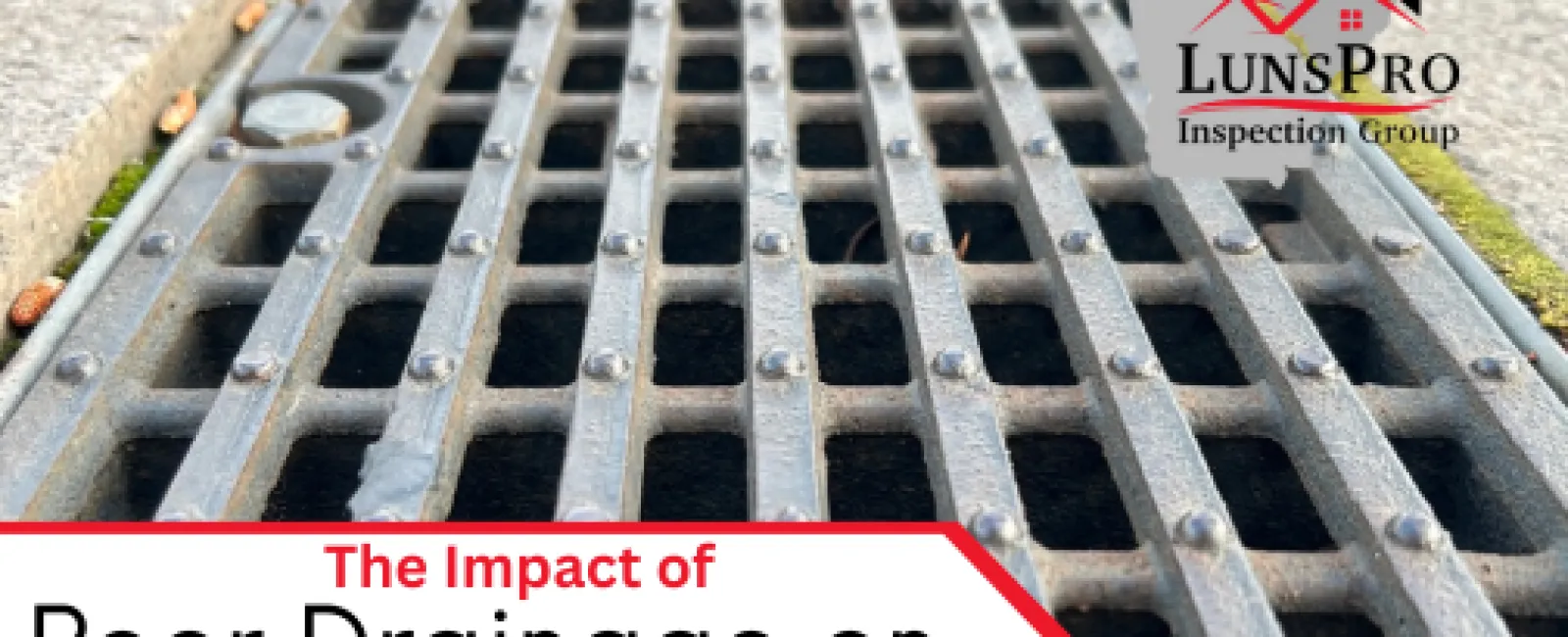Proper drainage is crucial for maintaining the structural integrity of a home. Poor drainage can lead to a host of issues, particularly affecting the foundation. In this article, we'll explore the impact of poor drainage on home foundations, discuss the signs of drainage problems, and highlight the importance of regular inspections. We'll provide valuable information to help homeowners safeguard their properties.
Understanding the Role of Drainage in Home Foundations
The foundation of a home is its most critical structural component, providing stability and support for the entire building. Proper drainage ensures that water is directed away from the foundation, preventing moisture buildup and minimizing the risk of damage. When drainage systems fail, water can accumulate around the foundation, leading to a range of problems that can compromise the integrity of the structure.
Common Plumbing Drainage Issues
Several factors can contribute to poor drainage around a home's foundation. Understanding these common plumbing drainage issues can help homeowners identify and address potential problems before they escalate.
Clogged Gutters and Downspouts: Gutters and downspouts are designed to direct rainwater away from the house. When they become clogged with leaves, debris, or other obstructions, water can overflow and pool around the foundation, increasing the risk of water infiltration and damage.
Improper Grading: The land surrounding a home should slope away from the foundation to ensure proper drainage. If the grading is incorrect, water can flow toward the foundation, leading to moisture buildup and potential structural issues.
Poorly Maintained Drainage Systems: Drainage systems, including French drains, surface drains, and sump pumps, require regular maintenance to function effectively. Neglecting these systems can result in water accumulation around the foundation.
Leaking Pipes: Plumbing issues, such as leaking pipes, can contribute to poor drainage. Water from leaks can seep into the soil around the foundation, causing erosion and weakening the structure.
Faulty Waterproofing: Insufficient or damaged waterproofing around the foundation can allow water to penetrate the structure, leading to moisture buildup and potential damage.
The Impact of Poor Drainage on Home Foundations
When drainage systems fail, the consequences can be severe. Poor drainage can lead to various problems that compromise the foundation's stability and the overall structural integrity of the home. Here are some of the key impacts:
Soil Erosion: Excess water around the foundation can cause the soil to erode. As the soil washes away, it creates voids and gaps around the foundation, reducing its support and increasing the risk of settling and shifting.
Foundation Cracks: Water infiltration can lead to the expansion and contraction of soil, putting pressure on the foundation. Over time, this can result in cracks in the foundation walls and floors, compromising the structural integrity of the home.
Basement Water Damage: Poor drainage can lead to water seepage into the basement, causing water damage to walls, floors, and belongings. This can also create a conducive environment for mold and mildew growth, posing health risks to occupants.
Uneven Settling: When water accumulates around the foundation, it can cause the soil to expand and contract unevenly. This uneven settling can lead to differential movement of the foundation, resulting in structural issues such as cracks in walls, uneven floors, and doors and windows that don't close properly.
Mold and Mildew Growth: Moisture buildup due to poor drainage can create a damp environment, which is ideal for mold and mildew growth. These fungi can cause health problems for occupants, including respiratory issues, allergies, and other health concerns.
Structural Weakening: Over time, the continuous presence of water can weaken the materials used in the foundation, such as concrete or masonry. This weakening can reduce the foundation's ability to support the structure, leading to potential collapse or major structural repairs.
Signs of Drainage Problems
Homeowners should be vigilant about the signs of drainage problems to prevent serious damage to their foundation. Here are some common indicators that there may be an issue with drainage:
Pooling Water: Water pooling around the foundation after rain is a clear sign of poor drainage. This standing water can seep into the foundation and cause damage over time.
Foundation Cracks: Visible cracks in the foundation walls or floors can indicate that water is putting pressure on the foundation. Horizontal cracks are particularly concerning and may suggest serious structural issues.
Wet Basement: A damp or wet basement is often a sign of poor drainage. Look for signs of water stains, mold, or mildew on the walls and floors of the basement.
Erosion: Soil erosion around the foundation can indicate that water is not being properly diverted away from the home. This can lead to settling and shifting of the foundation.
Musty Odors: A musty smell in the basement or crawl space can indicate the presence of mold and mildew, which thrive in damp environments caused by poor drainage.
Bowing Walls: If the basement or foundation walls appear to be bowing inward, it could be due to water pressure from poor drainage around the foundation.
The Importance of Regular Home Inspections
To protect their investment and ensure the long-term stability of their home, homeowners should prioritize regular home inspections. A comprehensive home inspection can identify drainage issues and other potential problems before they become serious.
Solutions for Poor Drainage
If poor drainage is identified, there are several solutions homeowners can implement to protect their foundation and prevent further damage. Here are some effective strategies:
Improve Grading: Ensure that the land around the home slopes away from the foundation. This helps direct water away from the foundation and reduces the risk of water infiltration.
Maintain Gutters and Downspouts: Regularly clean and maintain gutters and downspouts to ensure they are free of debris. Make sure downspouts extend far enough away from the foundation to direct water away from the home.
Install French Drains: French drains are an effective way to redirect water away from the foundation. These drains consist of a perforated pipe surrounded by gravel, which helps collect and channel water away from the home.
Use Sump Pumps: In areas prone to flooding or high water tables, sump pumps can help remove excess water from basements and crawl spaces. Sump pumps automatically activate when water levels rise, preventing water from accumulating around the foundation.
Repair Leaking Pipes: Address any plumbing issues promptly to prevent water from seeping into the soil around the foundation. Regularly inspect plumbing systems for leaks and repair them as needed.
Waterproof the Foundation: Applying a waterproof coating to the exterior of the foundation can help prevent water from penetrating the structure. This can be particularly effective in areas with high rainfall or poor soil drainage.
Poor drainage can have a significant impact on home foundations, leading to structural damage, water infiltration, and other costly problems. Homeowners must be proactive in addressing drainage issues and ensuring that their foundation is protected. Regular inspections by a qualified Atlanta, GA home inspector can help identify potential problems early and provide valuable insights into maintaining a healthy foundation.
By implementing effective drainage solutions and conducting comprehensive home inspections in Atlanta, GA, homeowners can safeguard their properties and ensure the long-term stability of their homes. Don't wait for problems to arise - take action today to protect your foundation and maintain the value of your home.
Remember, proper drainage is not just about preventing water damage; it's about preserving the integrity and safety of your home. Whether you're dealing with plumbing drainage issues, improper grading, or other challenges, addressing these problems promptly can save you from significant repairs and expenses in the future.
For comprehensive home inspections and expert advice on drainage and foundation maintenance, trust the professionals at LunsPro Home Inspections. Our experienced Atlanta, GA inspectors are dedicated to helping you protect your investment and ensure a safe, secure, and stable home.

